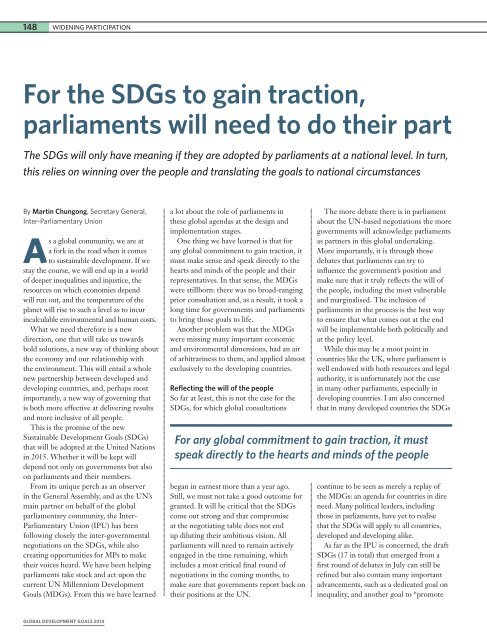FAMBB
FAMBB
FAMBB
Create successful ePaper yourself
Turn your PDF publications into a flip-book with our unique Google optimized e-Paper software.
148 WIDENING PARTICIPATIONFor the SDGs to gain traction,parliaments will need to do their partThe SDGs will only have meaning if they are adopted by parliaments at a national level. In turn,this relies on winning over the people and translating the goals to national circumstancesBy Martin Chungong, Secretary General,Inter-Parliamentary UnionAs a global community, we are ata fork in the road when it comesto sustainable development. If westay the course, we will end up in a worldof deeper inequalities and injustice, theresources on which economies dependwill run out, and the temperature of theplanet will rise to such a level as to incurincalculable environmental and human costs.What we need therefore is a newdirection, one that will take us towardsbold solutions, a new way of thinking aboutthe economy and our relationship withthe environment. This will entail a wholenew partnership between developed anddeveloping countries, and, perhaps mostimportantly, a new way of governing thatis both more effective at delivering resultsand more inclusive of all people.This is the promise of the newSustainable Development Goals (SDGs)that will be adopted at the United Nationsin 2015. Whether it will be kept willdepend not only on governments but alsoon parliaments and their members.From its unique perch as an observerin the General Assembly, and as the UN’smain partner on behalf of the globalparliamentary community, the Inter-Parliamentary Union (IPU) has beenfollowing closely the inter-governmentalnegotiations on the SDGs, while alsocreating opportunities for MPs to maketheir voices heard. We have been helpingparliaments take stock and act upon thecurrent UN Millennium DevelopmentGoals (MDGs). From this we have learneda lot about the role of parliaments inthese global agendas at the design andimplementation stages.One thing we have learned is that forany global commitment to gain traction, itmust make sense and speak directly to thehearts and minds of the people and theirrepresentatives. In that sense, the MDGswere stillborn: there was no broad-rangingprior consultation and, as a result, it took along time for governments and parliamentsto bring those goals to life.Another problem was that the MDGswere missing many important economicand environmental dimensions, had an airof arbitrariness to them, and applied almostexclusively to the developing countries.Reflecting the will of the peopleSo far at least, this is not the case for theSDGs, for which global consultationsbegan in earnest more than a year ago.Still, we must not take a good outcome forgranted. It will be critical that the SDGscome out strong and that compromiseat the negotiating table does not endup diluting their ambitious vision. Allparliaments will need to remain activelyengaged in the time remaining, whichincludes a most critical final round ofnegotiations in the coming months, tomake sure that governments report back ontheir positions at the UN.The more debate there is in parliamentabout the UN-based negotiations the moregovernments will acknowledge parliamentsas partners in this global undertaking.More importantly, it is through thosedebates that parliaments can try toinfluence the government’s position andmake sure that it truly reflects the will ofthe people, including the most vulnerableand marginalised. The inclusion ofparliaments in the process is the best wayto ensure that what comes out at the endwill be implementable both politically andat the policy level.While this may be a moot point incountries like the UK, where parliament iswell endowed with both resources and legalauthority, it is unfortunately not the casein many other parliaments, especially indeveloping countries. I am also concernedthat in many developed countries the SDGsFor any global commitment to gain traction, it mustspeak directly to the hearts and minds of the peoplecontinue to be seen as merely a replay ofthe MDGs: an agenda for countries in direneed. Many political leaders, includingthose in parliaments, have yet to realisethat the SDGs will apply to all countries,developed and developing alike.As far as the IPU is concerned, the draftSDGs (17 in total) that emerged from afirst round of debates in July can still berefined but also contain many importantadvancements, such as a dedicated goal oninequality, and another goal to “promoteGLOBAL DEVELOPMENT GOALS 2014


